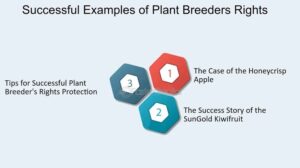Back to: Botany 400 Level
My sharp and focused Afrilearn scholar, welcome again! You’ve been doing so well, and today we’re stepping into a very important but often overlooked area—patents, copyrights, and plant breeders’ rights. These are not just “big grammar” from law textbooks—they affect who owns the rights to the crops you grow, the ideas you create, and the knowledge you discover.
Let’s break it all down, in a way that connects to real-life situations around us.
Patents, copyrights, and plant breeders’ rights
Imagine you spent five years developing a new variety of tomato that grows twice as fast and tastes sweeter. Now imagine someone else sees your work, copies it, and makes money from it—without even telling you thank you. Would that be fair? Of course not! That’s why we have things like patents, copyrights, and breeders’ rights—to protect innovation and encourage creativity, especially in science and agriculture.

These rights make sure people get recognised and rewarded for their work, whether it’s a new crop variety or a research discovery.
Understanding the Terms Simply
- Patent
A patent gives the creator of a new invention (like a genetically modified crop or a plant-based medicine) the exclusive right to use, make, or sell it for a certain number of years. During that time, others can’t use it without permission.
In plant biotechnology, if you invent a new plant variety through genetic engineering, you can patent it.
- Copyright
Copyright protects written or artistic work—like books, software, academic research, or even educational videos. If you write a paper on plant gene editing or create an e-learning video, copyright protects your intellectual effort.
- Plant Breeders’ Rights (PBR)
PBR is a special type of protection just for new plant varieties. If you develop a new maize or cassava variety, you can register for PBR. This means only you (or those you license) can produce, sell or distribute it for a set number of years.
In Nigeria, the Plant Variety Protection Act passed in 2021 supports breeders’ rights—especially to promote innovation in agriculture.
A scientist in Zaria develops a drought-tolerant rice variety. She applies for Plant Breeders’ Rights, gets legal ownership, and licenses the seeds to agro-dealers. Now, every time the rice is sold, she earns a royalty—money she can reinvest into more research. This motivates others to also breed better crops.

Why These Rights Matter
- They protect innovation and reward hard work.
- They encourage research and private investment in agriculture.
- They help farmers access better seeds with clear information.
- They support local ownership of African discoveries—no more brain drain or foreign exploitation.
Summary
- Patent protects inventions like new crop varieties or tools.
- Copyright protects written or creative work.
- Plant Breeders’ Rights protect newly developed plant varieties.
- These rights help researchers, scientists, and farmers benefit from their innovations.
Evaluation
- What is the purpose of plant breeders’ rights?
- How is a patent different from a copyright?
- Why are these rights important for African scientists and farmers?
You’re not just learning science—you’re understanding how to protect and profit from it. The future of Africa’s agriculture and innovation is bright because of thinkers like you. Keep growing your knowledge, and remember: you’ve got Afrilearn on your side every step of the way. Let’s keep going, champion!
